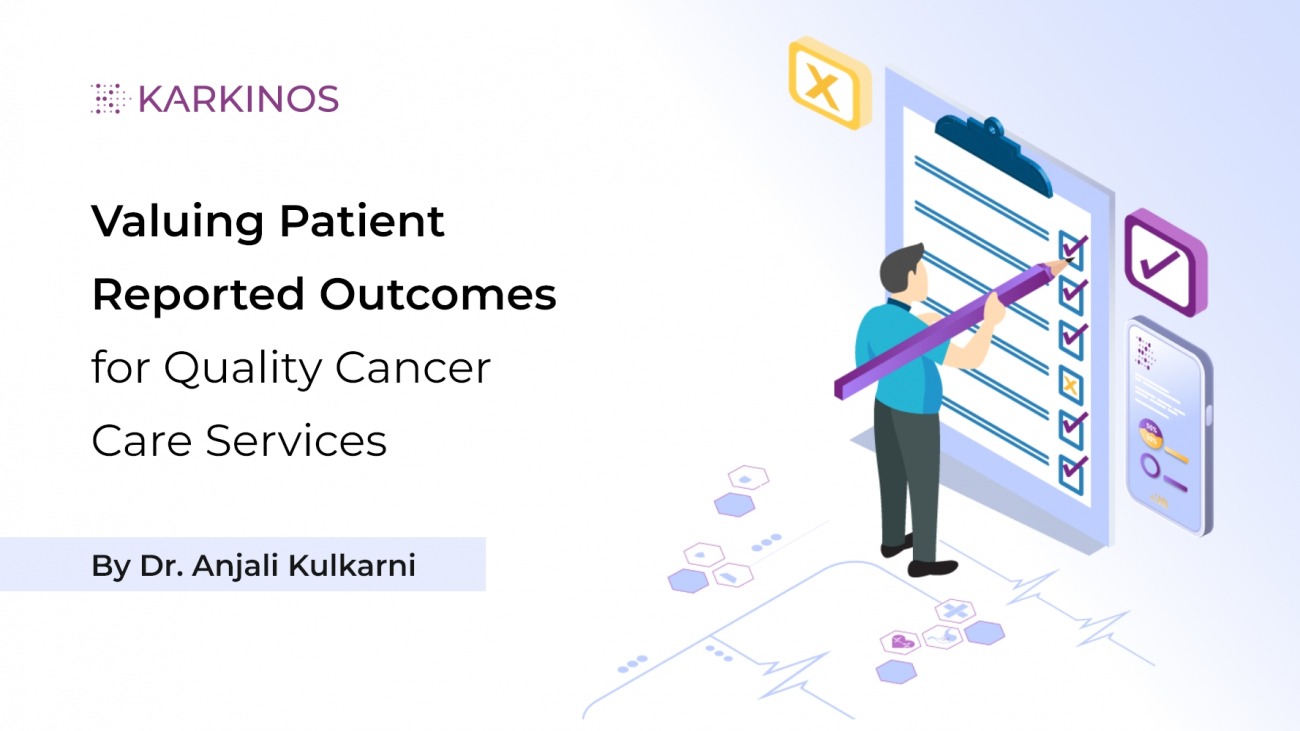Significance of tech-led Patient Reported Outcomes – The way forward in participatory healthcare
By Dr. Anjali Kulkarni, Vice President, Clinical Informatics, Karkinos Healthcare
The dawn of digital healthcare has made traditional care practices break its shackles. Healthcare Information Technology has led to redesigning processes to keep the patient as its center while connecting them with different stakeholders. A patient’s involvement in care is becoming increasingly prominent these days, as the assessment of outcomes based on a patient’s own health perspective is deeply valued. Using Patient Reported Outcome (PRO) measures are increasingly accompanying the traditional clinical ways of measuring health and the effects of treatment on the patient.
Patient is the epicenter of the clinical ecosystem. All the philosophies and policies in healthcare have to be for the utmost benefit of the patient. It is not only disease control but the outcome of the treatment and quality of life are of paramount importance, especially in oncology care. In this context, while participatory healthcare is very important and is gaining momentum, patients have to be active players in their own health journey and hence in this context PROs become absolutely important.
US FDA defines PRO as any report of the status of a patient’s health condition that comes directly from the patient, without interpretation of the patient’s response by a clinician or anyone else.
Participatory healthcare is very important and is gaining momentum, patients have to be active players in their own health journey
Importance of Patient Reported Outcomes for healthcare organizations and patients
Symptoms are usually one dimensional and it is the outcome of clinician-patient interaction, which can be very dynamic and transient. But PRO or health related quality of life (HRQOL) questionnaires or any such instruments are multidimensional. They cover many more aspects than the disease as such.
It is a multi-domain concept that represents the patient’s general perception of the effect of illness and treatment on various aspects of life such as physical, psychological, and social. PRO can be symptoms, events, thoughts, opinions in the daily life or disease journey. Caregivers can play an important role in addition to the patient. They are usually referred to by observer reported outcomes or proxy outcomes.
For patients, reporting outcomes themselves helps for accurate capture of severity and frequency symptoms along with psychological comfort. Hence, with quick diagnosis and accurate treatment, patients feel empowered towards their treatment response and are more positive about accepting their health conditions.
On the other hand, for healthcare organizations, the effectiveness of the treatment can be measured on a larger scale using PROs. Clinicians can modify treatment protocols and make it more inclusive to address other factors like nutritional support, psychological support, or financial toxicity management. A multidisciplinary team approach can be devised to improve satisfaction scores from patients and caregivers.
The other major advantage is that PROs can be very comprehensive especially in cancer treatments like chemotherapy, radiotherapy to document/assess frequency of symptoms, severity of symptoms, associated complaints and relieving factors or any such events. Additionally, any psychosocial implications. It can capture the effectiveness of any given treatment.
To summarize, by using PROs, various types of outcomes can be measured such as physical functions, symptoms, global judgments of health, psychological well-being, social well-being, cognitive functioning, role activities, personal constructs, satisfaction with care, health related quality of life (HRQOL), adherence to medical regimens and clinical trial outcomes.
Karkinos Healthcare aims to improve patient/citizen experience at all levels along the care continuum. We would like to take care beyond hospitals and doctors’ cabins to patients' homes.
Tech-aided PROs for superior outcomes
With digital health technologies becoming very accessible there has to be special interest in patient reported outcome applications. m-Health and other applications can be scaled, made accessible and data captured can be analyzed and acted upon.
At Karkinos Healthcare, with our distributed cancer care network and community programs, we are building a patient centric connected ecosystem. We aim to improve patient/citizen experience at all levels along the care continuum. We would like to take care beyond hospitals and doctors’ cabins to patients’ homes.
Karkinos Healthcare is a digital-first organization. Hence, we are keen to enable every stakeholder with m-health/web applications. Patients will be able to access the KH app for their queries, care navigation and at same time report outcomes or fill in questionnaires. The data from these platforms is collected and stored as Electronic Medical Records. Also, Karkinos Healthcare’s Command Center is designed for care navigation of patients and we will be empowering patients/citizens to report the outcomes using dedicated apps. These KH apps will have a clinician and care team interface where timely action can be taken.
As a dedicated cancer care team will get the patient information entered about any side effects and toxicities related to treatment then the appropriate treatment will be analyzed, decided by the Tumor Board and then advised to the patient. This can happen over digital platforms at a patient’s convenient location, eliminating the need for the patient to be always receiving care at a hospital premise. Effective triaging of the patient can be done early and can be referred to specialized treatment at our L2, L1 network hospitals. We plan to roll out a Quality of life questionnaire to every patient diagnosed and treated within the Karkinos Healthcare’s network. This will help us modify our tailor or personalize care plans that would ultimately result in quality treatment delivery from our end and also improving patient experience and satisfaction.
To be extremely patient-supportive and to cater our services to people of every walk of life, the KH apps are built to support native languages and are also available offline. Currently, the company can arrange video consultation and offer all telehealth services, which can be an extension of the commitment to improve patient care beyond homes.
Hence, Karkinos Healthcare will take into consideration every aspect of care that can help the company fulfill its vision of delivering standardized care that is truly scalable and certainly value based for every single person encountered by us.

 About Dr. Anjali Kulkarni
About Dr. Anjali Kulkarni